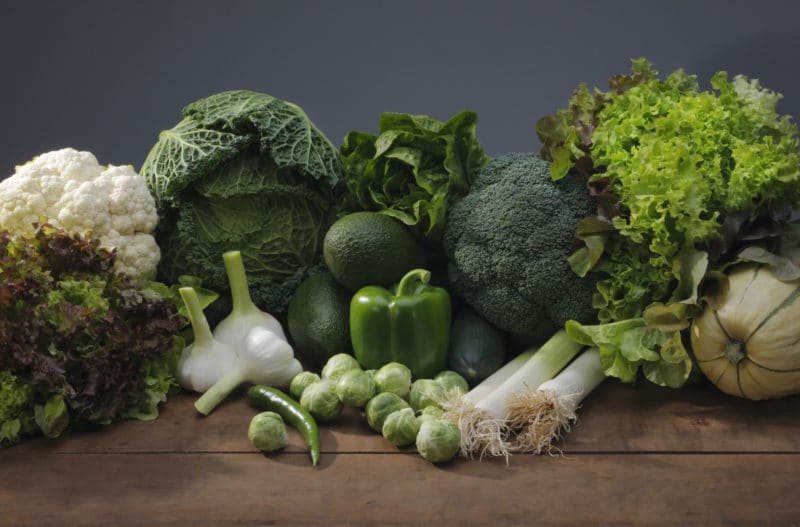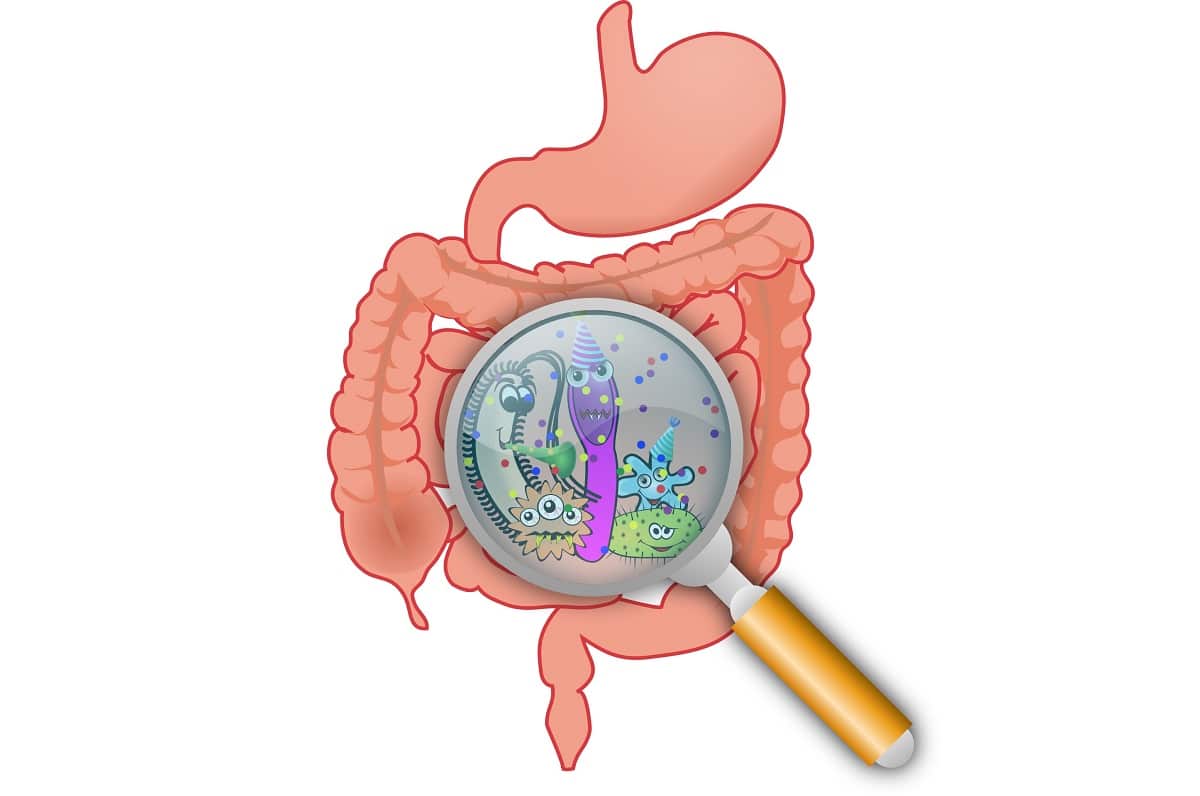Whether or not we like to admit it, everyone experiences gas from time to time.
In this article
Don’t be embarrassed — flatulence isn’t your fault.
Gas, farting, flatulence — or whatever you’d like to call it — can generally relate back to your diet, and what’s going on in your gut in terms of good and bad bacteria.
We’ll get into the nitty-gritty of gut bacteria in a few moments, but first, let’s talk about gas-producing foods.
The Fiber-Flatulence Connection
When you think of gas-producing foods, what comes to mind?
A raw broccoli salad at a potluck or steamed cauliflower at your Grandma’s Sunday dinner? Artichoke hearts at the salad bar, or purple cabbage coleslaw?
If you get gassy after eating any of these foods, I have an explanation for you.
The most common gas-producing foods are plant foods that are high in fiber. This includes the foods mentioned above, as well as other vegetables, legumes and some fruits, too, such as:
- Bananas
- Sweet Potatoes
- Beans: chickpeas, fava beans, navy beans, kidney beans
- Lentils
- Cabbage
- Brussels sprouts
- Apples
- Pears
- Radish
- Melon
The reason fibrous plant foods are considered gas-producing foods is because of the type of fiber found in their cell walls, and the body’s inability to digest it.
You see, plant foods contain a substance called cellulose that can only be broken down by the digestive enzyme, cellulase.
But there’s a problem with that: the human body doesn’t produce cellulase. Therefore, we’re unable to properly digest the fiber in plant foods and can end up extremely gassy after eating them (1).
Now, you may be wondering why Mother Nature created highly nutritious plant foods for us to eat if we can’t properly digest them. But there’s a good reason behind it.
The fact we’re unable to digest cellulose means that fiber-rich foods can move right through us, so to speak.
Sure, there may be some gas during the digestive process, but fiber is so valuable to our health because it cleans out the toxic waste from our intestinal tracts that would otherwise lead to low energy, illness and disease.
Gas-Producing Foods
If you’ve recently decided to try eating more nutrient-dense, plant-based foods while phasing out processed foods, congratulations!
You’ve taken a massive step towards improving your health. And I’m here to say, don’t let a little gas scare you away.
If you’re adding more plant foods into your diet and notice that you’re experiencing more gas than usual, that’s completely normal (2).
The reason for this is that your body is used to digesting refined foods that contain very little fiber. Therefore, you may experience obvious digestive symptoms at first as your body adjusts.
The gas will eventually start to subside, and there are effective solutions to keep the plant-based nutrition in your diet (without the flatulence) in the meantime.
How to Tame Gas-Producing Foods
Juicing
Since juicing removes all of the fiber, this can be a great short-term solution to allow you to enjoy all of the health benefits fruit and vegetables provide, without the digestive symptoms.
Smoothies
While blending fruits and vegetables into smoothies doesn’t remove their fiber, it does break the fiber down, or “predigests” it, and creates less work for digestive system.
Steaming
Steaming high-fiber vegetables, such as cauliflower, broccoli, Brussels sprouts and cabbage, can help make them easier to digest.
Note: if you’re just transitioning to eating more plant-based foods, steamed fibrous veggies might still cause gas.
Sprouting
By purchasing sprouted grains, or soaking and sprouting grains at home, you’ll reduce the amount of phytic acid present in the grains.
With a lower amount of phytic acid (which is an anti-nutrient, or nutrient-inhibitor), grains are digested much easier, and allow for better absorption and assimilation of their nutrients.
Often, many people with grain intolerance can easily tolerate sprouted grains because they’ve been pre-digested.
Digestive Enzymes
While our body doesn’t produce cellulase enzymes, health food stores carry digestive enzyme supplements with cellulase in them. A plant-based digestive enzyme can be an effective natural remedy to help get rid of the gas caused by gas-producing foods.
Why Your Gut Bacteria Makes You Gassy
The other reason you may be experiencing gas could be due to a lack of healthy, or beneficial bacteria in your gut (3) .
We require a balance of both good and bad bacteria to be healthy. When the bad bacteria overpopulate (which is a condition known as dysbiosis), your digestive system weakens and has a harder time digesting the foods you eat, which can lead to excessive and foul-smelling gas.
The most common causes of dysbiosis are diets high in processed foods, sugar and alcohol, as well as long-term antibiotic use and toxins in our environment such as pesticides.
Antibiotics and other toxins can upset the balance of your natural gut flora, while refined sugar, processed foods and alcohol feed the bad bacteria, and allow them to flourish and grow (4).
Sugar is exactly what the bad bacteria love to feast on, which is why temporarily avoiding consuming high amounts of carbohydrates that break down into sugar can help reduce the digestive symptoms, such as gas.
[Related: How to Stop Your Addiction to Sugar]
It’s also worth noting that prioritizing your gut health goes beyond getting rid of gas.
Your gut also contains immune system cells that communicate to keep your immune system healthy. This suggests that without a healthy gut, you cannot have an optimally functioning immune system (5).
The Solution for Gas Caused by Dysbiosis
If dysbiosis is the reason you’re gassy, then in addition to high-fiber foods, all starches and sugars can temporarily become gas-producing foods until your good bacteria is replenished.
Not to worry though — you can help increase the beneficial bacteria in your gut by eating fermented foods such as kefir, plain unsweetened organic yogurt, sauerkraut and kombucha (just make sure it has low amounts of sugar).
A high-quality probiotic supplement is another way to get your healthy gut bacteria on track quickly.
Even if you suspect you don’t have dysbiosis, try removing starch for a few days and see how you feel. You (and others) may be pleasantly surprised to notice the gas subside.
Try These 4 Tips to Get Rid of Gas
1. Chew Your Food
This almost seems too simple, right? Yet, a common cause of gas is poorly chewed food!
If you don’t chew your food properly (which can happen due to our busy lifestyles and trying to multitask), large chunks pass through your large intestine and try to enter your small intestine.
Before they can enter your small intestine, they must be broken down into smaller pieces. The extra work on your digestive system to break the larger pieces down can lead to gas.
2. Warm Lemon Water Before Meals
By adding a squeeze of lemon juice to a glass of room temperature or warm water, you’ll offer your body a dose of digestive enzymes (without the fiber) to help promote better digestion.
3. Ginger
Ginger has been used as a natural remedy to prevent flatulence and other digestive symptoms for thousands of years. Adding a slice of ginger to your lemon water or sipping on ginger tea throughout the day can help combat the gas.
4. Drink Raw, Unpasteurized Apple Cider Vinegar
As a fermented food, raw apple cider vinegar can help promote the growth of healthy gut bacteria and alleviate gas caused by dysbiosis or gas producing foods. Just be sure the variety you’re drinking is raw and unpasteurized, otherwise it won’t contain the same beneficial bacteria.
Looking for ways to make apple cider vinegar taste good?
I have a few quick and easy recipes that show you how to drink apple cider vinegar daily. Check the ACV Soda Detox, Hawaiian Apple Cider Vinegar Drink and the ACV and Greens Detox Salad.
As you can see, everyone can experience gas simply by eating foods high in fiber, or having their healthy gut bacteria a little out of balance.
By paying attention to how you feel after eating, you can begin to make the connection between which foods your body considers to be gas-producing foods, and make dietary and lifestyle adjustments accordingly.
What Next?
Did you enjoy this article on Gas-Producing Foods?
You might also like my free 1-Day Detox Plan that busts sugar cravings, restores youthful energy, and drops belly bloat… by tomorrow. Click the banner below to get it for FREE.


